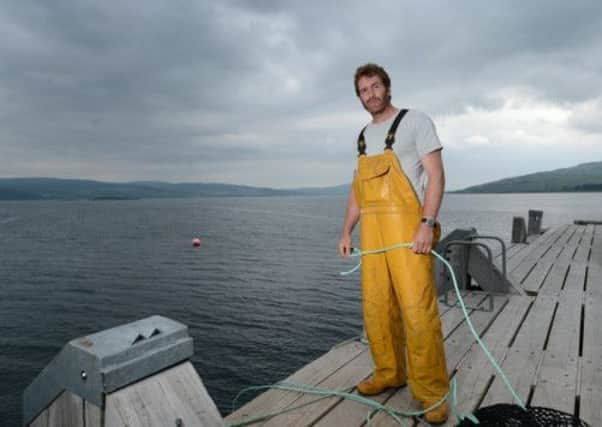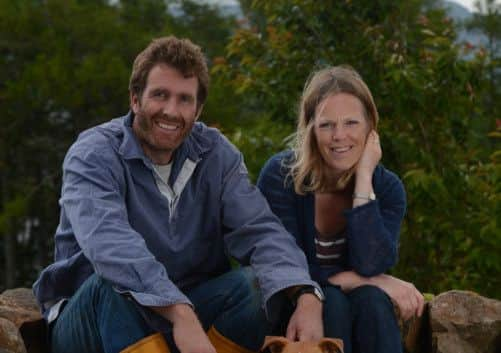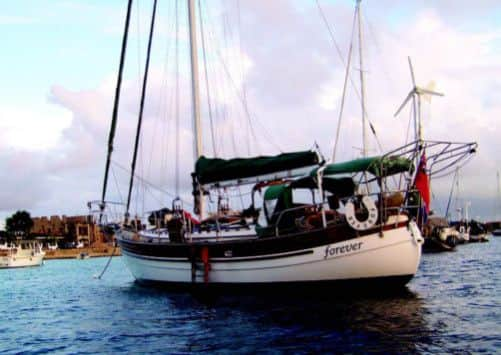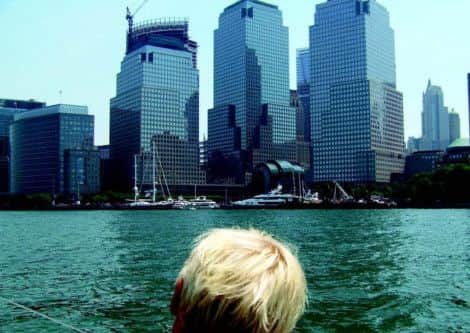Guy Grieve on gaining his Sea Legs


THERE’S a moment on the quayside on Mull, just after Guy Grieve de-gunks 16 scallops for the barbecue of some holidaying students and just before he sells a dozen more to a wispy-haired old sea dog from Holland who’s dropped anchor close by, where I’m thinking: I could do what he’s done. I could escape from the city and the office like him, to a place like this. Indeed, when he tells me he’s just lost his “shore guy”, I’m wondering: could I be Guy’s guy?
But it’s a moment that quickly passes, just as it would have done all those years ago when Grieve and I shared an office. In idle moments, we all fantasise about doing something different, daft, amazing. Then the tea break is over and we return to our screens and our routines. Except one day Grieve got up from his seat in the canteen, walked past his desk, past the giant exotic plants on the concourse floor that tantalise about far-off places, and right out the door. Last we heard he was living in Alaska, for a whole year, just to see if he could. Then he popped up on telly as a hunky adventurer. Then he became a fisherman, which is how I find him under a gunship grey sky in jeans, yellow wellies and – despite the snell wind which keeps your correspondent in his cagoule – a T-shirt stretched across a chest designed for widescreen.
Advertisement
Hide AdAlthough obviously daring, the 38-year-old Grieve’s first escape, which he recounted in the book Call Of The Wild earned him admiration but also criticism – not all of it fuelled by envy. How could he leave his wife and two young sons to try to find himself at minus 60 degrees? Had he not just gone from selfish to shellfish? In his previous life, Grieve worked in advertising, just like Mad Men’s Don Draper. What is it about the profession that tips men into crisis? Draper’s gets dressed up as an existential crisis so he can cheat on his wife a lot, then he gets re-married and cheats some more. Grieve, who was presumed to be suffering from an ordinary midlife crisis, obviously has a very strong marriage. And when he decided he needed a second escape there was no question that Juliet and the boys, Oscar and Luke, then seven and four, wouldn’t be coming with him.


This time, Grieve picked up a yacht off the coast of Venezuela and sailed her the 15,000 miles back to Mull. The adventure was as eventful as you’d expect, given he had almost no experience at the tiller. Pirates, intruders, tiger sharks, bull sharks, sea snakes and the Asian tiger mosquito were all encountered – along with the most dangerous waters in the Caribbean, 20ft waves, treacherous coral, near crashes, actual prangs, the over-friendly remora fish with its pesky sucker pads, over-friendly yachties who might have been swingers, and the good ship Forever not quite living up to its name by running out of drinking water and needing an entire new deck. The family stayed with him right up until the moment Hurricane Bertha intervened, but by then they’d seen Grieve get enveloped in a perfect storm of his own.
Everyone suffered from seasickness but he was worst-hit. Or he thought he was. Or as the captain and man of the vessel – with all his dented ego and guilt and self-pity – it seemed that way because he suddenly felt so impotent. In the book of the expedition, Sea Legs, he describes the moment when he’s forced to relinquish control to his 71-year-old father-in-law, an experienced sailor who acted as tutor for the early part of the journey:
“I was unable to continue as a functioning member of the crew and I was overcome by the worst feeling of shame that I have ever experienced… Hard and unhappy thoughts crowded around me: my sense of responsibility, my male pride, my duty as a father, my family made vulnerable. As I collapsed into one of the high-sided berths, I listened to the sounds of my little children suffering through the night, nursed by Juliet… I now seriously doubted I had the mental or physical resources needed to skipper the boat. A cupboard above my head flew open and bags of pasta and rice fell onto me… I just lay there looking like a breaded chicken as the dry food stuck to my sweaty skin, hating boats and the sea more than anything on earth and above all hating myself for failing.”
Nice poultry-based imagery, I say. “Thanks,” says Grieve with a chuckle as we stare down the Sound of Mull, him still in his T-shirt despite the sky glowering ever darker. He’s keen to know what I think of the book and will ask a few times, stressing that he’d love more than anything to become a full-time writer. “At one point my editor said to me: ‘Do you know, Guy, I’m actually beginning to hate you.’ I’d been detailing, with absolutely no veneers, what happens when a man through his own failings becomes incredibly bad and damaging for a family to be around. He made me take out almost 100,000 words of this stuff.


“Look, the great sea – mother ocean – threw a lot at us but I really failed – I was such an arse. I just wasn’t the person I am normally – at least not the positive, supporting and loving husband and father I think I am – and I got a glimpse of just how damaging men can be when they’re not cutting it. Yes, I got badly seasick but I was also sulking and feeling hugely sorry for myself – all the self-obsessing that I thought I hated. I withdrew into myself but there’s nowhere to hide out at sea – it’s so revealing.”
Advertisement
Hide AdSo why did he want to do it in the first place? The opening chapter paints a picture of domestic chaos on Mull that most of us with kids would label typical and maybe even cheery – heavy colds, mad search for lost homework and gloves, even madder scramble for the school bus – but which at that precise moment made Grieve scream. Groundhog Day. There was no way he was going to be doing this for the next ten years. Juliet passed him a piece of cold toast; she knew what was coming. Let’s buy a boat, he said, and go sailing. For a long time. And how would they pay for this romantic, crazy scheme? “We’ll sell the house! What has it ever done for us? It traps us in square rooms which are bad for the soul!”
Today on Mull, Grieve thinks back to his first adventure, how he was an “imposter” in a business suit, how he had to go to Alaska to “save my life”, how he burnt the suit. “Quite a few travel writers, guys like Eric Newby, started out selling,” he says, mentioning his big dream again, “but the problem for a lot of men is they don’t get the chance of a rite of passage the way women do. This might sound a bit hackneyed and pop-psychiatry, but women have a very profound connection with nature when they have children because of finding themselves in a life-or-death situation. Suddenly all the bullshit is stripped away. Am I going to survive this? Is my child going to survive? Men don’t get that, at least not in the same way, whereas women come out of the experience defined as mothers, with all that wiseness. Men, I think, need to sort themselves out.”
Advertisement
Hide AdDon’t men re-emerge as fathers? If the pop-psychiatry is turned on to Grieve, we would learn that his real father, who had “no concept of family”, walked out on his when the lad was seven. Grieve’s mother re-married but a much-loved stepfather – “He was everything to me” – died when he was 16. After that he tried, and failed, to enlist in the Gordon Highlanders. “I was looking for a father substitute there,” he admits, “plus I liked the idea of monastic simplicity.” And we should remember that among all his failures aboard Forever, there was the one as a son-in-law. “My father-in-law had always thought I was pretty much unbreakable, but that was on land. At sea I was this little vomiting cry-baby.”


So, lucky for Grieve that Juliet was so understanding about him seeking that simplicity in Alaska. “Yes, it’s a very lucky marriage. Julesy had a wonderfully wild and free childhood and doesn’t believe that just because you’re married you always have to be in the same space all the time.” If his wife suddenly decided she had to disappear for a year, would he be so understanding? “I’d like to think so, but that would be completely out of character for her. With me, she always knew it was going to happen. She’s just so much better than me that if she told me should wanted to do the same thing I’d be worried. She’s a better person, absolutely. And my sons are going to be better than me, too. They’re already better, character-wise, than I was as a boy and they’re really going to grow up to be good men.” Juliet, it should be said, didn’t exactly wait passively for his return from the frozen north. She sold their house in the Borders without his knowledge, moving the boys to Mull where she’s from. “At that point I was homeless on two continents,” he laughs. And she was the one who did the sums to make this epic journey possible, as they re-mortgaged the house and – in pre-recession times – borrowed on three credit cards to raise the £60,000 required for the 41ft, 16-ton cutter-rigged boat.
It wasn’t only domestic sameness that made him want to bolt again. What the book doesn’t reveal is that he was also running away from Guy Grieve, TV personality. In The Wild Gourmets, he was the hunter-gatherer, roaming the British countryside with gun and hook to bring back supper for Masterchef winner Thomasina Miers to cook by their tent. The pair were reunited for A Cook’s Tour Of Spain. Then he shinned up 300ft trees in a threatened part of Australia for Climbing The Giants, while Living With Monkeys posted him to a treehouse in the Gabon jungle to try to help save the rare red-capped mangabey. He winces as I reel the shows off.
“Well, TV is incredibly easy money. These series were paid holidays – anyone who claims TV is hard work is talking rubbish – but they were fluff, not very good, pretty embarrassing, just a big heap of crap.” Reviewing the first instalment of The Wild Gourmets I counted two gratuitous naked bum shots (Grieve, not Miers) and a third that was borderline. A later edition had him replicate the “shower under the waterfall” shot which I’m A Celebrity… Get Me Out of Here! reserves for its most pneumatic of soap-opera sexpots. “I just wasn’t very savvy,” he admits, “and I got swallowed up by the superficiality of TV. I’m not saying it isn’t fun to hang out with these north London production companies – it was, for a while – but TV isn’t really interested in treating the great outdoors seriously. It just goes for the lowest common denominator and I became a meat puppet and an anger outlet for the people watching. Quiet justifiably, too. If I was watching back then, I’d have thought: ‘Who is this knob?’”
Eventually he said: “I’m Guy Grieve and I do take wildernesses seriously… get me to another one.” He wanted to be put in his place, in every sense. “I was sick of myself. I didn’t do TV because I needed self-validation but I did want to feel completely small and insignificant again. I knew the Atlantic, like Alaska, would be a great liberator, the kind of place that reminds you that TV is nothing and that you are and always will be a Z-list purveyor of barely passable content.”
At times he felt cripplingly insignificant, but Juliet saved the day, the whole trip. “After we’d rammed this moored yacht arriving into St Kitts I reached what I thought was the end and said: ‘I just can’t do this anymore.’ Juliet said: ‘Well, you stop if you want to, I’m carrying on. I’m going to sail this bloody thing all the way back to Mull.’ You know, societies that ostracise or don’t appreciate women are malfunctioning cultures because the strength they have is of another dimension. Juliet is an incredible woman. I realised this at that point and we carried on.”
Advertisement
Hide AdIn the end Grieve made the Atlantic crossing with a reserve first mate summoned from the Trinidad boatyard where they’d stopped for their new deck, finding others trapped in a spiral of running repairs lasting as long as eight years. In New York, Grieve and Juliet – by that point a slick team – decided the ocean was too risky for the boys.
He survived 60ft waves which reached over the yacht’s mast, the highest recorded off Ireland’s west coast. Fair play for that, but I’m keen to hear about Oscar and Luke, now 13 and ten, and what they got out of the experience.
Advertisement
Hide Ad“Oscar was away from school for 11 months but we reckoned that at that age life experiences were really what count for kids. Juliet organised the home schooling, or boat schooling, which she ran with naval discipline. If they didn’t listen they were in big trouble. And when Oscar went back to his class he was two years ahead of the rest. He’d read an amazing amount on the journey, starting with all the Tintin books – he became Captain Haddock – and moving on to the complete Harry Potter works.
“Neither has read as much since, and maybe that’s unfortunate, but they had to get back to dry land, to normal. We met other families living all the time at sea and the parents were control freaks. Nothing belonged to the kids, who were totally dominated. Ours needed their own patches of bracken, their own trees, their own rooms again. Both of them were exceptional. So good at amusing themselves, so resilient, so brave. I think they came back with a sense of the size of the planet and both of them fell in love with the sea. They still talk about the trip a lot; they just don’t want to do it ever again!”
And what of Grieve, who dives for scallops four times a day, dispatches them to fancy restaurants and has never known hard work like this – is the adventuring itch now well and truly scratched or does he yearn for another? “Oh yes. I for one miss the boat, which I sold to a master-of-ships and is now gathering moss in Ardfern. It was my freedom machine and this is the greatest road on earth.” The sun has come out and he’s pointing down the Sound of Mull. “It’s connected to New York Harbour, you know, and I could be there in just 22 days.” Me, I look out across the same expanse of water only concerned about the whereabouts of the homeward ferry.
Twitter: @aidansmith07
• Sea Legs (Bloomsbury) is published on Thursday